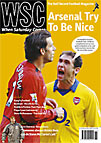 Paul Pomonis examines the bribery allegations that have tainted football in Greece
Paul Pomonis examines the bribery allegations that have tainted football in Greece
On September 7, Greece beat Armenia 1-0 in Yerevan in a Euro 2004 qualifier. A few hours later, Suren Baghdassarian, press officer with the Football Federation of Armenia, alleged that the Hellenic Football Federation (HFF) had unsuccessfully attempted to buy the game. According to Baghdassarian, in the days leading up to the game, former Armenia international Yervard Sukassyan had repeatedly phoned the national manager and the chairman of the federation, offering $1 million (£600,000) on behalf of the HFF chairman Vassilis Gagatsis in order to secure victory. The Armenian officials had taped the incriminating phone calls and, prior to the match, notified UEFA’s match delegate, who decided to give the match the go-ahead and look at the case afterwards. Based on the evidence collected since, UEFA have appointed a disciplinary inspector, Austrian Gerhard Kapl, who is expected to report back ahead of the final series of qualifying matches on October 11.
In Greece, the allegations were met with uneasiness rather than outrage. Greek football has not recovered from the 2002 revelations on the existence of the paranga, a widespread corruption mechanism involving officials, referees and club directors which for years had been fixing matches on all levels – a scandal, incidentally, for which nobody has been held accountable. Moreover, the names of the alleged protagonists contributed to the pervading sense of uneasiness: Sukassyan had spent three seasons in Greece in the late 1990s, playing for moderate clubs. On retiring, he stayed on as an agent, specialising in importing Armenian players. His brother Varusan is a former Armenia manager, who only a few months ago accused goalkeeper Roman Berezovsky of throwing the Euro 2004 qualifier against Ukraine. For such a well connected man, Sukassyan’s claim that he wouldn’t recognise the chairman of the Greek FA if he met him on the street rung hollow.
Gagatsis is no stranger to controversy, either. A lawyer from Salonica, he was first elected secretary general of the HFF in 1997 and got deeply involved in the katharsis war with the government over the control of the industry, which brought Greek football close to expulsion from FIFA. His election was so controversial that it earned him a prosecution for bribery (coincidentally the same amount, $1m, had been mentioned at the time), a charge he only managed to beat last year.
In 2001 he was unanimously elected HFF chairman, but his reign has not been smooth. In 2001 and 2002, his two vice-chairmen were savagely beaten by persons unknown in what looked suspiciously like mob hits. In 2003 he was indicted for abuse of duty, while also having to defend himself against comments made by a former referee over his alleged role in fixing a third division game. For such a seasoned veteran, Gagatsis’ initial public reaction upon hearing of the Armenian claims (“It was the Armenians who tried to approach us but we weren’t interested”) left much to be desired. Wisely, he subsequently decided to omit that particular line of argument from his defensive strategy, choosing instead to blame it all on in-fighting inside the Armenian federation.
Whether UEFA fall for that remains to be seen, but if Greek football’s past record of summarily dismissing allegations against rich clubs attempting to buy their way to success is anything to go by, then the signs are encouraging. After all, Gagatsis’ experience as a permanent member of UEFA’s appeals body must have provided him with a clear understanding of the system.
That sort of knowledge may have prompted him to include in the dossier the Greek FA presented to Dr Kapl a load of newspaper clippings, reportedly supportive of the Greek arguments. In which case, I can only hope he did not add the following snippet, which appeared in the respected Athens newspaper To Vima on the day of the Yerevan match: “Friday, September 5: Gagatsis, the chairman of the FA, Theodorides, the FA’s public relations manager, Pilavios, PAO’s public relations man in Europe and Siotropos, an arduous student of refereeing, have departed for Armenia. Their goal is to find a way for Greece to beat Armenia and thus promote our country abroad. After securing qualification they will set up a European paranga and will accommodate their friends.”
From WSC 201 November 2003. What was happening this month